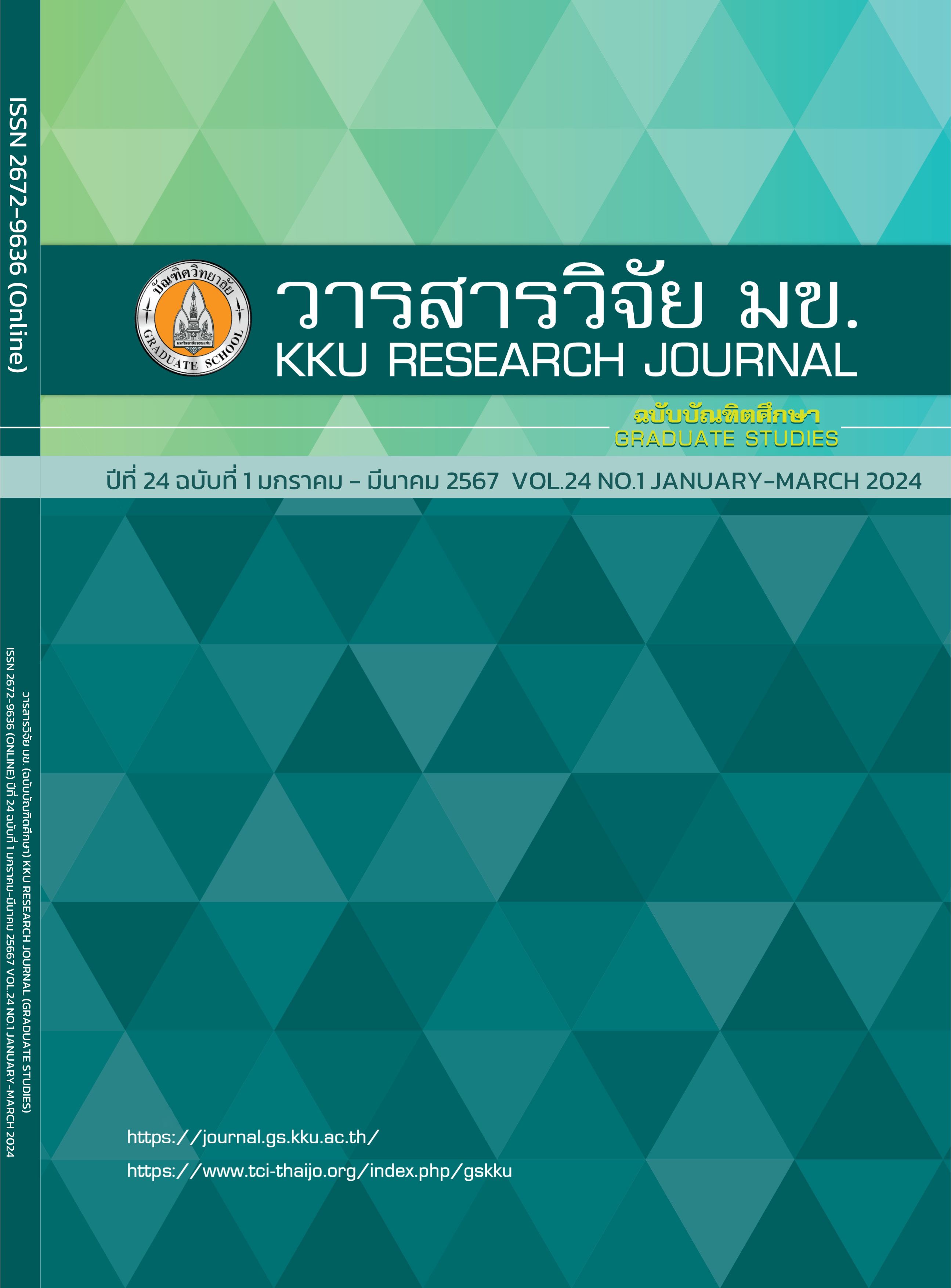ผลกระทบของความหนาแน่นที่มีต่อคุณสมบัติของบล็อกประสาน
คำสำคัญ:
บล็อกประสาน, ความหนาแน่น, กำลังรับแรงอัดบทคัดย่อ
งานวิจัยนี้ ทำการศึกษาผลกระทบของความหนาแน่นของบล็อกประสานที่มีต่อกำลังรับแรงอัดและการดูดซึมน้ำตัวอย่างบล็อกประสานมีอัตราส่วนระหว่างปูนซีเมนต์ต่อดินลูกรังเท่ากับ 1:6 และ 1:8 และอัดขึ้นรูปให้มีความหนาแน่น 1800 1900 2000 2100 และ 2200 กิโลกรัมต่อลูกบาศก์เมตร คุณสมบัติที่ทดสอบประกอบด้วยกำลังรับแรงอัดที่อายุ 7 14 และ 28 วัน และการดูดซึมน้ำที่อายุ 28 วัน จากการศึกษาพบว่า บล็อกประสานมีการพัฒนากำลังรับแรงอัดเพิ่มขึ้นตามอายุ โดยเมื่อความหนาแน่นเพิ่มขึ้นในช่วง 1800 ถึง 2100 กิโลกรัมต่อลูกบาศก์เมตร บล็อกประสานมีกำลังรับแรงอัดเพิ่มขึ้น แต่เมื่อความหนาแน่นเพิ่มขึ้นจาก 2100 เป็น 2200 กิโลกรัมต่อลูกบาศก์เมตร กำลังรับแรงอัดของบล็อกประสานมีค่าลดลง การดูดซึมน้ำของบล็อกประสานมีค่าลดลงเมื่อความหนาแน่นเพิ่มขึ้น เมื่อเปรียบเทียบระหว่างอัตราส่วนปูนซีเมนต์ต่อดินลูกรังเท่ากับ 1:6 และ 1:8 พบว่า อัตราส่วน 1:6 มีกำลังรับแรงอัดสูงกว่าอัตราส่วน 1:8 ในขณะที่การดูดซึมน้ำของอัตราส่วน 1:6 มีค่าน้อยกว่าอัตราส่วน 1:8 บล็อกประสานทุกอัตราส่วนและทุกความหนาแน่นมีกำลังรับแรงอัดและการดูดซึมน้ำที่อายุ 28 วัน ผ่านมาตรฐานผลิตภัณฑ์ชุมชน มผช.602/2547 ของบล็อกประสานชนิดรับน้ำหนัก
เอกสารอ้างอิง
Saramakom S. Usage of fly ash for manufacturing interlocking block [MSc thesis]. Nakhon Ratchasima: Suranaree University of Technology; 2013. Thai.
Dechburum A. Interlocking block containing fly ash and bottom ash [MSc thesis]. Maha Sarakham: Mahasarakham University; 2018. Thai.
Charoon C. Interlocking blocks containing oil palm ash and shells waste. Journal of Community Development and Life Quality. 2014; 2(1): 103-112. Thai.
Dasaesamoh A, Vaji P, Salae P, Naesae N. Para rubber wood fly ash containing interlocking brick. Journal of Yala Rajabhat University. 2015; 10(1): 77-86.
Sangiamsak N, Cheerarot R. Use of water supply sludge as a mixture in soil cement block. Proceeding of the 12th National Convention on Civil Engineering; 2007 May 2-4; Amarin Lagoon Hotel, Phitsanulok: The Engineering Institute of Thailand under H.M. the King’s Patronage; 2007. p.195-199.
Kongsomsaksiri S, Pongsuwan A. Paving blocks mixed with sludge. Bangkok: King Mongkut’ s University of Technology North Bangkok; 2009 May. Report No.: RDG5050022.
Khamput P, Suweero K, Boksuwan A, Panlai N. The use of volcanic rock dust in interlocking block products. 2015; 3(2): 239-247. Thai.
Yingchaloenkitkhajorn K, Klathae T. Applied of crushed oyster shell in the interlocking block product for rural community. Bangkok: College of Industrial Technology and Management, Rajamangala University of Technology Srivijaya; 2018.
Garaged S. Interlocking block manufactured from cement and crushed golden apple snail shell [MSc thesis]. Nakhon Ratchasima: Suranaree University of Technology; 2014. Thai.
Nuansawan N. Utilization of label waste for making interlocking concrete paving block by using limestone power-cement as binder [MSc thesis]. Bangkok: Chulalongkorn University; 2008. Thai.
Amornfa K. Engineering properties improvement of interlocking block by mixing with sand. Naresuan University Engineering Journal. 2016; 11(1): 67-73. Thai.
Hirun Y, Greepala V, Nokkaew K. Qualitative improvement of Sakon Nakhon lateritic interlocking block soil by backfill sand. Proceeding of the 16th National Convention on Civil Engineering; 2011 May 18-20; Chonburi: The Engineering Institute of Thailand under H.M. the King’s Patronage; 2007.
Kokkamhaeng W, Thongnoi S, Hiranmarn W, Puangprakhon P. Capacity of compressive strength and water absorption of blockprasan. Proceeding of the 15th National Convention on Civil Engineering; 2010 May 12-14; Sunee Grand & Convention Center, Ubon Ratchathani: The Engineering Institute of Thailand under H.M. the King’s Patronage; 2010.
TCPS 602/2547. Thai Community Product Standards. Thai Industrial Standards Institute (TISI), 2004.
TISI 109-2547. Standard for Sampling and Testing Concrete Masonry Units, Thai Industrial Standards Institute, 1974.
ดาวน์โหลด
เผยแพร่แล้ว
ฉบับ
ประเภทบทความ
สัญญาอนุญาต
ลิขสิทธิ์ (c) 2024 วารสารวิจัย มข. (ฉบับบัณฑิตศึกษา)

อนุญาตภายใต้เงื่อนไข Creative Commons Attribution-NonCommercial-NoDerivatives 4.0 International License.



